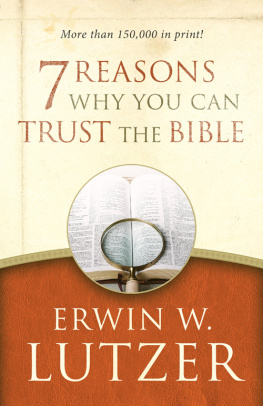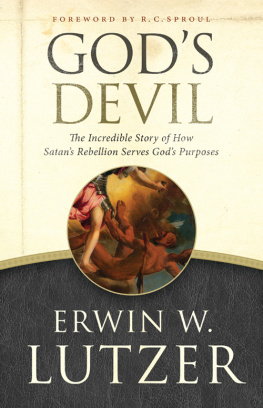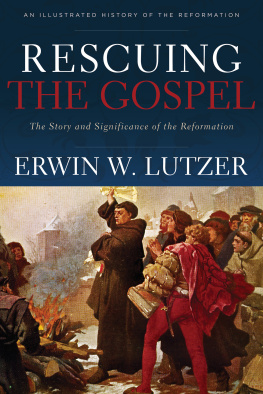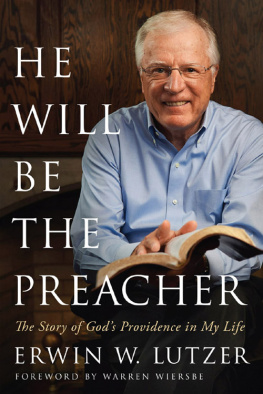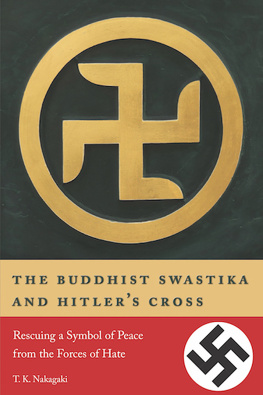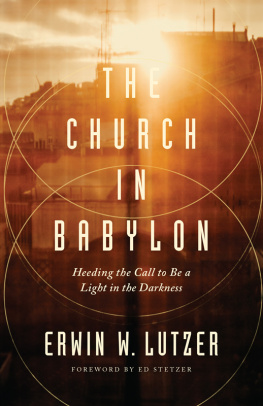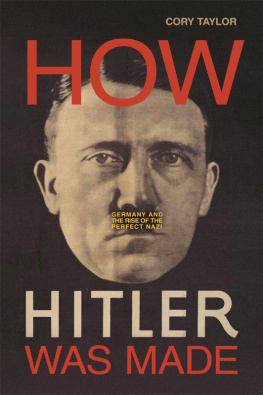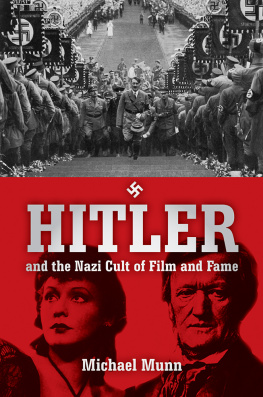Table of Contents
Pagebreaks of the print version
Guide

1995, 2016 by
ERWIN W. LUTZER
All rights reserved. No part of this book may be reproduced in any form without permission in writing from the publisher, except in the case of brief quotations embodied in critical articles or reviews.
All Scripture quotations are taken from the New American Standard Bible, 1960, 1962, 1963, 1968, 1971, 1972, 1973, 1975, 1977, 1995 by The Lockman Foundation. Used by permission. (www.Lockman.org)
Cover design: Smartt Guys design
Interior design: Erik M. Peterson
Cover image: The National Archives
Library of Congress Cataloging-in-Publication Data
Lutzer, Erwin W.
Hitlers cross : how the cross was used to promote the Nazi agenda / Erwin W. Lutzer.
p. cm.
ISBN 978-0-8024-1327-7
1. National socialismReligious aspectsChristianity. 2. National socialism and religion. 3. CrossesPolitical aspectsGermanyHistory20th century. 4. SwastikasGermany History20th century. 5. Hitler, Adolf, 1889-1945Religion. 6. Symbolism in politicsGermanyHistory20th century. 7. Church and stateGermanyHistory20th century. 8. GermanyPolitics and government1933-1945. 9. GermanyChurch history1933-1945. 10. CrossesPolitical aspectsUnited States. I. Title.
DD256.7.L87 2012
322.1094309043dc23
2012014894
We hope you enjoy this book from Moody Publishers. Our goal is to provide high-quality, thought-provoking books and products that connect truth to your real needs and challenges. For more information on other books and products written and produced from a biblical perspective, go to www.moodypublishers.com or write to:
Moody Publishers
820 N. La Salle Boulevard
Chicago, IL 60610
1 3 5 7 9 10 8 6 4 2
Printed in the United States of America
With affection to the members and friends of The Moody Church, whose love and prayers have been a constant encouragement to me and my family and whose witness for Christ is a reminder that the Cross is still the power of God unto salvation.
CONTENTS
Friend,
Thank you for choosing to read this Moody Publishers title. It is our hope and prayer that this book will help you to know Jesus Christ more personally and love Him more deeply.
The proceeds from your purchase help pay the tuition of students attending Moody Bible Institute. These students come from around the globe and graduate better equipped to impact our world for Christ.
Other Moody Ministries that may be of interest to you include Moody Radio and Moody Distance Learning. To learn more visit http://www.moodyradio.org/ and http://www.moody.edu/distance-learning/
To enhance your reading experience weve made it easy to share inspiring passages and thought-provoking quotes with your friends via Goodreads, Facebook, Twitter, and other book-sharing sites. To do so, simply highlight and forward. And dont forget to put this book on your Reading Shelf on your book community site.
Thanks again, and may God bless you.
The Moody Publishers Team

T his is a book that needed to be written.
Years ago I experienced a defining moment on a bone-chilling day in the concentration camps of Auschwitz and Birkenau. The physical discomfort of the elements paled to insignificance when I walked through the rooms of this human hell that had witnessed spectacle after spectacle of the depths to which the human mind can descend once the conscience dies. Hitler himself said it all: I want to raise a generation of young people devoid of a conscienceimperious, relentless, and cruel.
Speechless, I stared at the pictures of children hurt and humiliated by experimentations performed on them. I suddenly realized that everyone had left the room except for one other man who, like me, seemed overwhelmed and needed to say something to somebody. He turned and asked what kind of work I did.
I replied, I am a minister of the gospel.
His reply carried the weight of history: Gives you a lot to think about, doesnt it? His implication was clearwhere was the church in all this? I paused and then asked him what kind of work he did.
He hesitated, then said, I am a judge from the state of New York.
I think we both have a lot to think about, I said.
Much has been written about the Nazi era, but I have often wished that someone with insight and ability would help us achieve a deeper understanding of that dreadful period of history. We have needed a probing analysis that would do justice to what happened and relate it to the mindset of every major institution in the landeven the churchand society at large.
This is that book. Erwin Lutzer brings a studied, yet passionate, response to the hows and whys and what ifs of this tragedy. Here we have a biblical interpretation of how Adolf Hitler provoked the bloodiest, most unnecessary, most disruptive war in history and possibly changed irremediably the pattern of our world.
Scores have asked the obvious: How could ordinary human beings wittingly or otherwise become pawns in Hitlers hands to discharge the most brutal orders? Leading Nazi hunter Peter Malkin told of his experience while tracking down Adolf Eichmann. He confessed that he was shocked when he cupped his hand over Eichmanns mouth and realized that he was a mere human. The more he stared at him, the more he wondered how such a fragile man had wielded such devilish powers. Further, and more to the point, Malkin said, I longed to get into his head and ask why, but I couldnt succeed.
In an article in the Journal of Modern History, Professor Michael R. Marrus of the University of Toronto attempts to unravel the mystery of Nazism in an essay entitled Reflections on the Historiography of the Holocaust. As brilliant as his attempt is, here again a deep puzzlement remains. Quoting noted Holocaust historian Christopher Browning, who insisted that there was more to it than fanatical obedience, he writes, These men seem to have been totally enthralled by their status as civil servants, and Whatever else they may have felt or desired personally, any action that might have tarnished their reputation as efficient and reliable bureaucrats was unthinkable to them. They were dominated by an internal compulsion to keep their records unstained. This compulsion was so strong that it blotted out any sense of individual responsibility. Marrus adds, These men and men like them became desk murderers.
Such explanations leave us unsatisfied. Can we get behind all of the predictable analyzing and cut through to the reality of what it was all about? Can we get past the bureaucratic desks to learn from history and not repeat its mistakes?
That is why this treatment by Erwin Lutzer is so important for this generation. Once you begin this book, it will be difficult for you to put it down. It is worthy of the most serious mind and eager intellect. What these pages unfold can make a difference in everyone who cares to conserve the future by remembering the past. In fact, if I recall correctly, that very challenge is etched on the walls of the Holocaust Museum in Jerusalem. Erwin Lutzers book provides just such an impetus and, in so doing, serves mankind in a monumental sense.
RAVI ZACHARIAS


